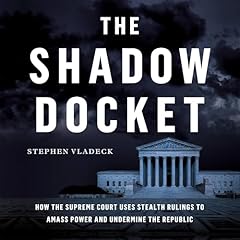
51 Imperfect Solutions
States and the Making of American Constitutional Law
No se pudo agregar al carrito
Add to Cart failed.
Error al Agregar a Lista de Deseos.
Error al eliminar de la lista de deseos.
Error al añadir a tu biblioteca
Error al seguir el podcast
Error al dejar de seguir el podcast
 Exclusivo para miembros Prime: ¿Nuevo en Audible? Obtén 2 audiolibros gratis con tu prueba.
Exclusivo para miembros Prime: ¿Nuevo en Audible? Obtén 2 audiolibros gratis con tu prueba.Compra ahora por $20.56
-
Narrado por:
-
David Drummond
When we think of Constitutional law, we invariably think of the US Supreme Court and the federal court system. Yet much of our constitutional law is not made at the federal level. In 51 Imperfect Solutions, US Court of Appeals Judge Jeffrey S. Sutton argues that American Constitutional law should account for the role of the state courts and state constitutions, together with the federal courts and the federal Constitution, in protecting individual liberties.
The audiobook tells four stories that arise in four different areas of Constitutional law: equal protection; criminal procedure; privacy; and free speech and free exercise of religion. Traditional accounts of these bedrock debates about the relationship of the individual to the state focus on decisions of the US Supreme Court. But these explanations tell just part of the story. The audiobook corrects this omission by looking at each issue - and some others as well - through the lens of many constitutions, not one constitution; of many courts, not one court; and of all American judges, not federal or state judges. Taken together, the stories reveal a remarkably complex, nuanced, ever-changing federalist system.
©2018 Oxford University Press (P)2018 HighBridge CompanyLos oyentes también disfrutaron:




















Las personas que vieron esto también vieron:

Excellent Look Into a Complicated Issue
Se ha producido un error. Vuelve a intentarlo dentro de unos minutos.
This is a pretty advanced book on rights, legal history and courts' powers. It is written by a judge and seemingly has lawyers as an audience. Given that, it is very interesting and might be very influential.
These are interesting times in our legal system (with all the excitement and foreboding that might engender). Conservative judges are digging back into the texts and reexamining powers of government that have been taken for granted since -- let's say most sharply, about 1936. That is not to say the legal overgrowth (if one so thinks) is merely being chopped away. Let's say the structural parts are being looked at hard by very powerful judges. It is surprising who this may benefit -- it is not merely the script that the powerful help the powerful. This book is another interesting facet of these issues and these times. The author is very thoughtful and by no means a knee-jerk ideologue politically. His judicial temperament runs deep.
Other wellsprings of rights
Se ha producido un error. Vuelve a intentarlo dentro de unos minutos.
My takeaways from the book are the facts of the four cases discussed than anything else and the I do concede that there are some merits in the bottom up approach for Constitutional Law. Like Gideon v Wainwright where right to attorney was federalized once enough states picked it up on their own, I concede that states ought to act as the first experimenters and the successful implementations can then be weighed and federalized. But, there are times when we are one country and there are times when we are 50 states. Sometimes a regional solution doesn't provide equality. For example, take Obergfell v Hodges where the facts of the case show that two married couple suddenly find themselves out of matrimony by the whim of states. Even the cases that discussed, it is not universally accepted that Supreme Court did more damage than necessary. Mapp set standard nationwide for Bill of Rights instead of leaving to whims of individual states that can discriminate against minorities. And, the author fails to establish the justification for more weight to state claims. Yes, different states had different approaches to eugenics. This doesn't invalidate the US Supreme Court and having one central repository for the rights is preferable than individuals having to review states' constitutions every time they want to move to a new state. Finally, yes Supreme Court is tied down from interpreting laws broadly while states can experiment. So, I do agree people might have greater chance to win in state courts.
A decent opinion from an established jurist
Se ha producido un error. Vuelve a intentarlo dentro de unos minutos.


